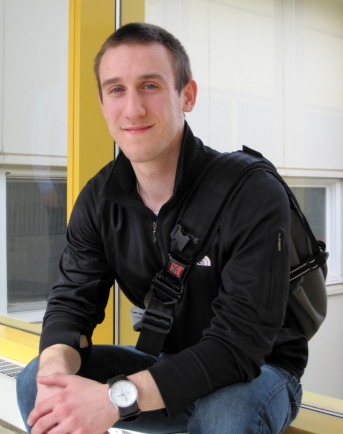
Tim Just recently completed his degree in kinesiology. He's about to embark on master's studies with Dr. Darren DeLorey
When we're hot or in a warm environment and stand up suddenly some of us might feel lightheaded or nauseous as our blood pressure suddenly drops. But it doesn't happen to everyone. Why it happens at all intrigued kinesiology undergraduate student, Tim Just and his quest led him to an opportunity to work on a research project questioning how the heart responds when people are heat-stressed.
Earlier this year Just's research earned him the award for "outstanding presentation in biophysical sciences" at the annual Bertha Rosenstadt National Undergraduate Research Conference at the University of Toronto where he delivered his paper, "Investigating the Prevalence of Increased Orthostatic Intolerance in Heat-Stressed Humans."
Just was particularly interested in looking at the difference in the output of blood from the heart's left ventricle in study participants who were first heat-stressed, then tilted 30 degrees to simulate the effects of standing (an orthostatic challenge), and who then either experienced symptoms of faintness or nausea, or had no symptoms at all.
Participants were then divided into groups based on their response to heat stress: those who experienced symptoms of syncope (faintness) and those who didn't.
Just assessed the output of blood from the left ventricle using two-dimensional echocardiography, and measured brain blood flow and beat-by-beat arterial blood pressure at the same time. "It's important to keep the brain perfused with blood to maintain consciousness," says Just. "If you don't, the person will faint.
"We found big differences in the diastolic phase of the heart between people who were symptomatic and asymptomatic. The volume of the heart, when completely filled, decreased much more in the symptomatic group than the asymptomatic group. That meant that because the heart wasn't able to sufficiently supply the brain with enough blood, it resulted in feelings of lightheadedness and nausea in the symptomatic participants."
While what he's found is intriguing, he says that what's he's looking at is part of a larger question. "This is a small part of understanding the maintenance of cardiac function, and brain/blood flow plays a small role," he says. "There are many other factors in play, so we don't quite know yet why people are experiencing pre-syncopal symptoms in these conditions. We do need to do more research."
Just says his appetite for research has been whetted. In September this year he begins his master's degree this September with Dr. Darren DeLorey looking at vascular tone control. It's a 180 degree switch for Just who began a business degree at the MacEwan University and confesses to detesting science at school!
He's thrilled with this twist of fate though. "My undergraduate degree has been a great experience, particularly for the connection you get with faculty. I can't imagine doing the things I've been able to do here, anywhere else."